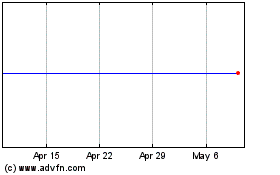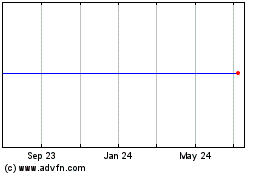By Rory Jones in Tel Aviv and Jared Malsin in Cairo
Investors in Israel's natural-gas fields agreed Monday to supply
an Egyptian company with gas valued at $15 billion, a deal that
will build on growing ties between once-hostile neighbors that now
share a common enemy in the restive the Sinai Peninsula.
Houston's Noble Energy Inc. and Israel-based Delek Drilling-LP
will supply 64 billion cubic meters of natural gas over 10 years
from the Tamar and Leviathan fields to Egypt's Dolphinus Holdings
Ltd., Delek said in a statement.
Monday's long-awaited gas deal represents a political boon for
Israeli Prime Minister Benjamin Netanyahu, who has promoted exports
to build diplomatic ties in the Middle East and beyond. Israeli
officials hailed the deal as a step toward peace and regional
cooperation.
"This is a joyous day," Mr. Netanyahu said in a statement.
The deal could raise some tough questions for Egyptian President
Abdel Fattah Al Sisi. He had promised to use gas from Egypt's
offshore fields to make the Arab world's most populous nation
energy self-sufficient again. Now, ahead of presidential elections
next month, his government faces deepening suspicions about its
relations with Israel.
Egypt and Israel already have significantly increased security
cooperation to deal with growing militancy in the Sinai Peninsula
in recent years.
Gas deals with Israel have been politically explosive in Egypt
in the past. Former President Hosni Mubarak came under attack for
selling gas to Israel in the years before he was ousted in a
popular uprising in 2011.
Analysts said the conclusion of the gas deal weeks before the
March election was remarkable given the political sensitivity of
the matter and reflects Mr. Sisi's confidence with dealing with any
protests at home.
"At the end of the day, any dissent is completely dealt with,"
said Karim Ezzat, a Cairo-based oil and gas analyst with Pharos
Holding.
President Sisi, who came to power following a military coup in
2013, is running in an election in which his only credible
challengers have been jailed or otherwise sidelined.
Representatives for President Sisi, Egypt's Petroleum and
Foreign Affairs Ministries didn't immediately respond to calls
seeking comment. Dolphinus also didn't respond to multiple
calls.
The deal follows months in which the Egyptian government hailed
the new exploitation of the Mediterranean's largest offshore gas
field as a transformative step for the country's economy. Egypt
until 2014 was a net exporter of gas, but soaring local energy
consumption outpaced supply, forcing Egypt to turn importer.
Production began at Egypt's Zohr field in December and was expected
to help meet the domestic demand. The Israeli gas deal complicates
that picture.
"It goes to show, being a net importer or exporter is too
two-dimensional," Mr. Ezzat said. "Probably what's going to happen
is, there are periods of the year where you're going to be a net
exporter, and there are going to be periods of the year where
you're going to be an importer."
The deal to import Israeli gas and production from its own
fields could help Egypt become a gas hub, analysts say, with at
least some of it liquefied and exported after meeting domestic
demand.
The new deal also raises questions about how the gas would be
transported. Gas exports from Egypt to Israel ceased after a series
of militant attacks on a pipeline across the Sinai Peninsula, where
an insurgency has raged for years. The Egyptian armed forces are
currently engaged in a major offensive against Islamic State
militants who have killed hundreds of soldiers, police officers and
civilians in recent years.
"That's going to be one of the priorities, places to keep safe,
to be sure," said Mr. Ezzat, referring to the Sinai pipelines.
The agreement between the Israeli firms and Dolphinus follows a
deal signed in 2016 for the Leviathan partners to supply Jordan's
national power company with gas valued at as much as $10 billion.
The Tamar field also already supplies some customers in Jordan.
The gas companies said one potential route of export from Israel
to Egypt could be through Jordan -- which is already linked by a
pipeline to the Egyptian grid -- in a scenario that would neatly
tie the countries together economically. After fighting multiple
wars, Israel signed peace agreements with Egypt in 1979 and Jordan
in 1994.
Dolphinus, a company that represents nongovernmental, industrial
and commercial consumers in Egypt, signed a preliminary deal in
2015 to import up to 4 billion cubic meters of natural gas for up
to 15 years from Tamar. Monday's deal supersedes that agreement,
Delek said.
Egypt had frozen plans to import Israeli gas in 2015, demanding
that Israel drop an arbitration case over gas. An international
arbiter ruled that the North African country's state-owned energy
companies owed $1.76 billion to state-owned Israel Electric Corp.,
or IEC, after Egyptian exports to Israel abruptly stopped in 2012
because of militant attacks on a pipeline through the Sinai
Peninsula.
It wasn't immediately clear whether the arbitration was
resolved. Another option being considered for transporting the gas
from Israel to Egypt would be to reverse the flow of the pipe
damaged in the militant attacks, Delek said.
Noble is a major stakeholder in Tamar and the Leviathan, which
has an estimated 22 trillion cubic feet of gas, or enough to supply
Israel for 100 years. Other significant interest owners in the
fields are Delek and Israeli firms Ratio Oil Exploration LP and
Isramco Negev 2 Limited Partnership.
Write to Rory Jones at rory.jones@wsj.com and Jared Malsin at
jared.malsin@wsj.com
(END) Dow Jones Newswires
February 19, 2018 15:24 ET (20:24 GMT)
Copyright (c) 2018 Dow Jones & Company, Inc.
Noble Energy (NYSE:NBL)
Historical Stock Chart
From Mar 2024 to Apr 2024

Noble Energy (NYSE:NBL)
Historical Stock Chart
From Apr 2023 to Apr 2024
